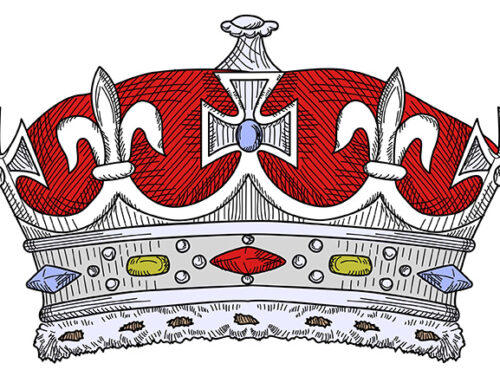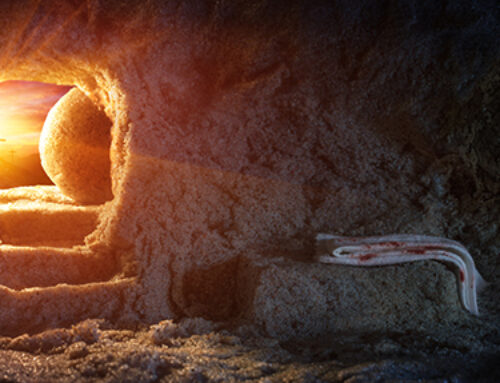The British preacher, W.E. Sangster, began to lose his voice and mobility in the mid-1950s. He had a disease that caused progressive muscular atrophy. He recognized the end was near, so he threw himself into writing and praying. In the midst of his suffering he pleaded, “Let me stay in the struggle, Lord. I don’t mind if I can no longer be a general but give me just a regiment to lead.”
Sangster’s voice eventually failed completely, and his legs became useless. On Easter morning just a few weeks before his death, he took a pen and shakily wrote his daughter a letter. In it he said, “It is terrible to wake up on Easter morning and have no voice with which to shout, ‘He is risen!’ But it would be still more terrible to have a voice and not want to shout.”
The doctrine of the resurrection of the dead was a highly debated issue in the first century when the two prominent sects of Judaism were the Pharisees, who believed in a bodily resurrection, and the Sadducees, who did not. Hebrews 5:11-6:3 establishes a solid foundation for Jews who became followers of Jesus.
The meaning of life is defined by our Lord’s resurrection.
 It is totally human for us to think that life is all about who and what we experience here on earth. This is natural because this is all we know. We assume our skin colour is the only one, until we see others. We don’t realize there might be another language than our own, until we hear one spoken. Similarly, it’s hard to imagine what life is like on the other side of death until we actually go there.
It is totally human for us to think that life is all about who and what we experience here on earth. This is natural because this is all we know. We assume our skin colour is the only one, until we see others. We don’t realize there might be another language than our own, until we hear one spoken. Similarly, it’s hard to imagine what life is like on the other side of death until we actually go there.
The apostles and the other followers of Jesus believed that He was the Messiah, the Saviour, but they missed the prophecies and references to His death and to His resurrection. They didn’t seem to have a place for this in their theology and expectations. The Jesus in their minds was not yet the God who is but the God they wanted Him to be. Then came Resurrection Sunday (Luke 24:1-12)!
Without the resurrection of Christ, the crucifixion was a terrible tragedy. Unless Jesus was raised, everything He said and did was a horrible waste. We learn in the Gospel accounts of Matthew, Mark, Luke and John that Jesus appeared to a variety of women and men. If two or three credible witnesses can be found who agree on the critical facts of a crime, then a judge or a jury will believe them. According to the Apostle Paul in 1 Corinthians 15, the resurrected Christ appeared to more than 500 witnesses!
What part in Christ’s resurrection story impacts you the most? How does the resurrection of Jesus affect your daily life?
The meaning of life is defined by our resurrection.
 When Jesus arrived at the home of Mary and Martha, their brother Lazarus had died and been placed in the tomb four days earlier. We get to hear the conversation Jesus had with Martha in John 11:20-27. We tend to focus on the resurrection of Lazarus here in John chapter 11. We are justifiably amazed at what Jesus did by raising him from the dead, but let’s not miss the significance of what Jesus said here. Resurrection is not focused on a past or future event, but on a person. Jesus is the resurrection and the life. Our hope doesn’t rest on our intellect, good deeds, or even our statement of faith. Our resurrection stems not from Christianity, but from Christ!
When Jesus arrived at the home of Mary and Martha, their brother Lazarus had died and been placed in the tomb four days earlier. We get to hear the conversation Jesus had with Martha in John 11:20-27. We tend to focus on the resurrection of Lazarus here in John chapter 11. We are justifiably amazed at what Jesus did by raising him from the dead, but let’s not miss the significance of what Jesus said here. Resurrection is not focused on a past or future event, but on a person. Jesus is the resurrection and the life. Our hope doesn’t rest on our intellect, good deeds, or even our statement of faith. Our resurrection stems not from Christianity, but from Christ!
This is why the Apostle Paul made it his life’s goal to know Christ and the power of his resurrection, saying in Philippians 3:10-11, “I want to know Christ—yes, to know the power of his resurrection and participation in his sufferings, becoming like him in his death, and so, somehow, attaining to the resurrection from the dead.”
Legendary physicist Stephen Hawking passed away on March 14th, 2018 at the age of 76 after battling motor neuron disease for 55 years. He spoke candidly in a 2011 Guardian interview about what he believes happens when people die. He told the Guardian that while he “wasn’t afraid of death,” he was in no hurry to die. “I regard the brain as a computer which will stop working when its components fail. There is no heaven or afterlife for broken down computers; that is a fairy story for people afraid of the dark.”
It should come as no surprise that Hawking was an atheist. In Hawking’s 2010 book, The Grand Design, Hawking stated that a creator is “not necessary” in the narrative of how the world was created (source: usatoday.com). I wonder what Stephen Hawking believes now. His statement of faith is the exact opposite of what the Bible says about eternity.
The Apostle Paul concluded in 1 Corinthians 15:32 that if there is no resurrection, “Let us eat and drink, for tomorrow we die.”—NIV
 What kind of experience have you had with death? How does your approaching resurrection shape your priorities of time, energy and money?
What kind of experience have you had with death? How does your approaching resurrection shape your priorities of time, energy and money?
The meaning of life is defined by Our Lord’s Resurrection and Our Resurrection. The here and now finds purpose in the hereafter.

Allan Pole
CESLM President
al@eslcooperative.ca






























































